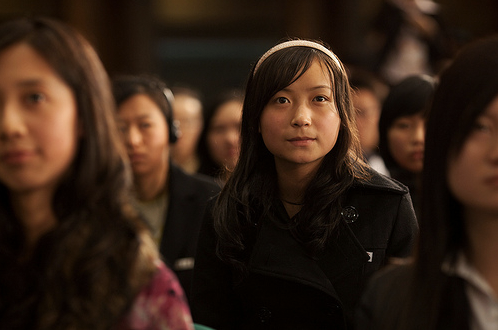Human Capital in US-China Relations

by Jeff Wang
NEW YORK, November 25, 2009 – During his recent trip to China, U.S. President Barack Obama announced at a joint press conference with Chinese President Hu Jintao, that the United States would commit to dramatic increase—100,000 over the next four years—of Americans studying in China. This is just one highlight for advocates and practitioners of international education in both China and the United States.
The President’s agenda—although filled with issues of great importance including cooperation on global climate change, nuclear nonproliferation, economic recovery—included a prominent emphasis on people-to-people connections, particularly among young people, as well as the critical role that language competency plays in these exchanges.
This emphasis is evident during a town hall meeting in Shanghai with local students. President Obama was introduced by U.S. Ambassador to China Jon Huntsman, a fluent Chinese speaker. Mr. Obama greets the audience in the local Shanghainese dialect, and then praises the Ambassador’s fluency in Chinese language as a personification of the deep ties and respect between our two nations. Mr. Obama also not-entirely-jokingly acknowledges that his Chinese "is not as good as [the Chinese students’] English.”
I appreciate the President’s explicit and implicit recognition of the integral role of language and cultural understanding in the process of building mutual trust and seeking solutions to common challenges. There is an urgent need for more opportunities for American students to learn Chinese and about China, an ever more critical player in the world arena, with whom only through engagement and collaboration, can we bring solutions to world’s most acute challenges. Without these opportunities, our young people are losing edge in a rapidly “flattening” world, to use Thomas Friedman’s very appropriate metaphor.
Here is one quantifiable measure of the advantage of being multilingual: imagine if other children were given twice as much time to prepare for a high-stakes exam as your own kid. You would scream unfair bias. But that is exactly what is happening when young people around the world are studying foreign languages throughout their elementary and secondary education in preparation for future work and leisure, and U.S. schools' emphasis on student language acquisition are statistically trailing far behind. Understanding one’s counterparts’ native tongue also draws tremendous confidence, regardless if the issue in question requires competition or cooperation.
We look forward to the day when not only our ambassador speaks Chinese, but many more members of the U.S.-China Strategic and Economic Dialogue do. Tim Geithner already does; more of us should. Our future leaders in all fields are right here, right now, in our schools today. There are few issues of great importance as to offer Chinese and other language instruction to all our students, and put the world into a world-class education.